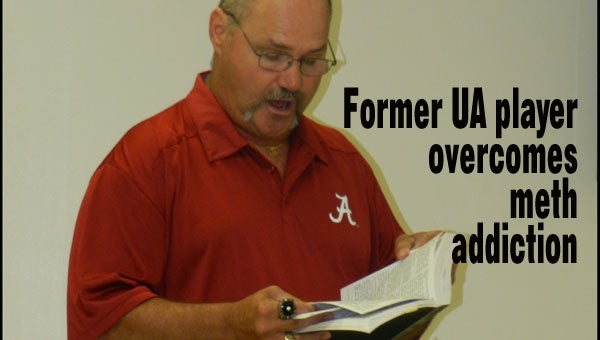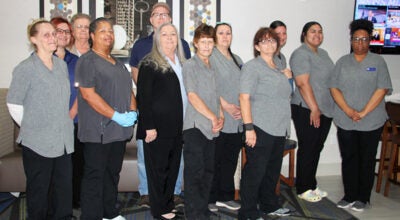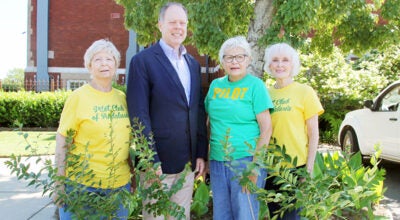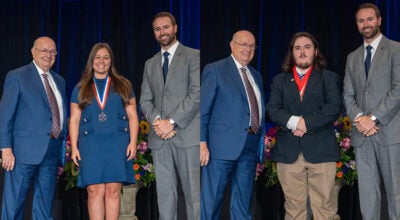Faith like a mustard seed
Published 12:00 am Tuesday, September 30, 2014
Johnny Dyess is convinced he survived 12 years of meth use for a reason.
The former University of Alabama football player sports two national championship rings that make his strong hands look small.
But in his bible, he keeps mustard seeds, he said. Mustard seeds are referenced in three of the four gospels, he said, but it is Matthew 17 that he likes best.
“ … if you have faith as small as a mustard seed, you can say to this mountain, ‘Move from here to there,’ and it will move,” he said.
Dyess spoke at Westview Baptist in Opp Saturday night for the annual Recovery Month event.
“I was raised by Christian parents,” he said. “I have no excuses for any of the stuff I’m going to share.
“I graduated from high school in 1978, and was blessed to have an opportunity to go the University of Alabama and play for coach Paul ‘Bear’ Bryant.
“My senior year in high school, Alabama lost one game, to Nebraska.
“My freshman year, we were ranked in the top 1 or 2. We played Nebraska in Birmingham and beat them. We beat Missouri at Missouri. Then the third game, Southern Cal came to Birmingham and took us to the woodshed.”
Dyess recalled how Bryant made the players practice beginning at 11 the next morning.
“It was the scout team’s job to get the team ready,” he said. “In Coach Bryant’s way of thinking, it was our fault (we lost).”
The team didn’t experience another loss until his senior year, he said, adding that he played in Bryant’s final game, the 315th victory that made him the winningest coach in history.
“And life was good for Johnny Dyess,” he said.
“All that time, football and sports were No. 1. Partying and drinking were No. 2. Family and friends were third, and God was fourth or fifth.
“Alcohol was a regular thing. Marijuana became a regular thing,” he said. “I left school, came home, and cocaine came into my life.”
He said he was playing softball, traveling every weekend and coming home on Sunday nights.
“In April 1985, I was introduced to drug called crystal meth,” he said. “It is a life-controlling drug. It will kill, steal, and destroy everything good in your life.”
Without the money to support his habit, he said, his choices were to become a thief or learn to produce.
“I was manufacturing weekly for close to 12 years,” he said. “My whole life was doing meth, getting ingredients, or making meth.”
But things changed in 2008.
“On July 29, 2008, God sent a band of angels to my house,” he said. “I was standing on the porch with a friend and I saw a line of black SUVs. I said, ‘Somebody is fixing to get in trouble.’
“They pulled right up in my driveway. I had a full lab in operation.”
Dyess was charged with manufacturing, possession of a controlled substance, possession of marijuana, and possession of drug paraphernalia. The officers seized 60 guns.
“I was put under a $350,000, cash-only bond,” he said.
Despite calls to his parents and his attorney, he was stuck.
“A friend, a deputy who lived next door to Mama and Daddy, told them, ‘Do not get him out of jail if you want to save his life.’ ”
To add insult to injury, he said, everybody in his cell block wore orange – the color of his former team’s biggest rivals.
“I hated it,” he said.
After a couple of weeks, he said, he finally turned to his Bible and read a little bit.
The third week, he got to visit with his parents.
“I was sitting with my parents face to face,” he recalled. “I was handcuffed and in shackles, in the chief deputy’s office. His key would not unlock my handcuffs. He said it’s the only time it’s ever happened to him before or since.
“I was a broken man,” he said.
The deputy told him people using meth had a life expectancy of about six years.
“I didn’t have the guts to tell him I had already been doing it for 12 years,” he said.
Then, Dyess said, he was told there was a place he could get in to if he were willing to go, His Place, in Opelika.
“Do y’all know where Opelika is? It’s very close to Auburn,” he said. “But even Auburn was better than jail.”
Meanwhile, with his paperwork held up, there was nothing to do in jail but read the Bible and attend an occasional worship service. A fellow inmate walked by and asked what he was doing.
The inmate had never heard of a bible, Dyess recalled, adding that he tried as best he could to explain the bible and salvation.
“That night we heard something, and it was that John Brown preacher again,” he said. “He talked on faith and salvation. He explained it better than I could. We said the Lord’s prayer and that man gave his life to Christ.”
The next morning, Dyess said, he paperwork was in order.
“God kept me there, and used me to share a little bit of what I knew.”
He moved on to the recovery program His Place near Opelika, where he remained for a year. Near the end of his stay, he had an opportunity to make a trip to Times Square Church in New York City. He was asked to remain and work in the maintenance department.
“Auburn was one thing, but New York was something else,” he said. “I’m from Elba, Ala., and I’ve only been to New York one time for three days.”
But he prayed about it, he said, and in the back of his mind, thought it would put the charges off for another year.
He had an apartment in the back of the church, which attracted 10,000 people every Sunday in three different services. He moved 2,500 chairs each week, swept, mopped, and cleaned toilets, among other duties.
When it was almost time for him to return to Alabama, an elder asked him what he would do.
“I said, ‘I’m probably going to prison,’ ” he recalled.
“The elder said, ‘Do you not believe? Start praying for the DA and his secretaries. Pray for your lawyer, for the judge and the court reporter. Give it to God.”
When he returned to Alabama, he got a maintenance job at his home church. A month later, he found the letter in mail from the district attorney.
“This was not my first rodeo,” he said. “But I would slide by, pay a fine, do a couple of days in jail. This time, I was facing serious prison time.”
Nervous, he said, he put the letter on his dresser, got on his knees and prayed.
“I asked God not just to get me out of trouble, but for a better way of life,” he said. “I accepted that I was guilty, but I said, ‘If you’ve got something better for Johnny to do for you, I’ll do it.’ ”
When he worked up the courage to read the letter, he learned the charges had been nolle prossed.
“That means they’re gone,” he said. “The grand jury chose not to charge me.”
His attorney was as surprised as he was, he said.
His church members – who had prayed for him for 30 years – elected him a deacon. And this year, he was hired as a groundskeeper and assistant coach at Elba High School.
“I pray over the campus every day,” he said. “I pray with the football team two times every day. I try to set an example.”
Addiction leads to a vicious cycle, he said, encouraging those there to pray for anyone they know who has a problem.
“All things being equal, I should have gone to prison,” he said. “But God had other plans.”
He said his family and church never stopped praying.
“And I had to have that faith of a mustard seed,” he said.





